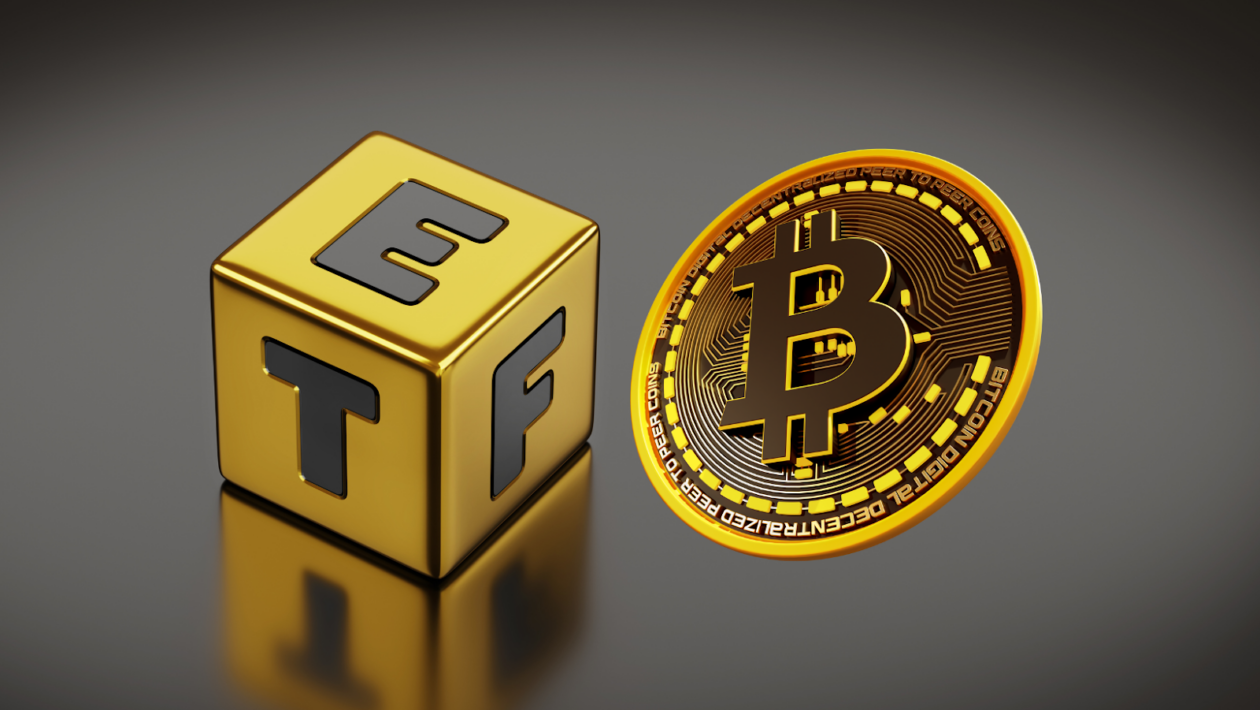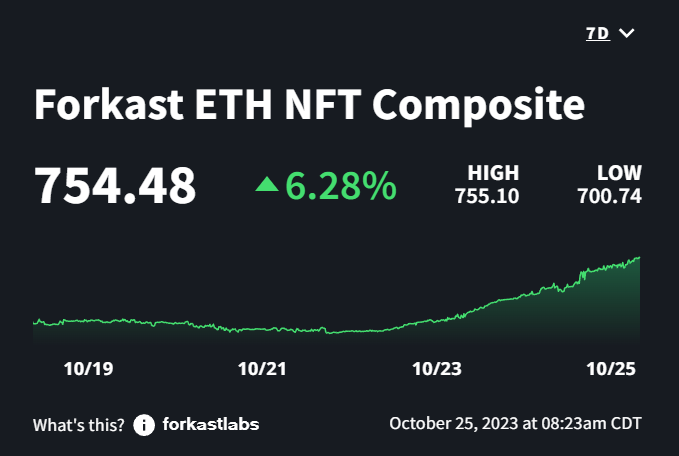In this issue
- ETF price pump
- Ethereum NFTs on the up
- Working blues
From the Editor’s Desk
Dear Reader,
It’s not like it came out of nowhere. We’ve known for some time about the potential for a spot Bitcoin ETF bounce and the buzz it can bring back to the crypto industry. But what many were unprepared for was the huge surge in Bitcoin’s price over the past week. Briefly topping US$35,000 during Tuesday trading, Bitcoin is up around 23% for the past 7 days as we go to print.
It started Oct. 16. Crypto media picked up on a post claiming the U.S. Securities and Exchange Commission (SEC) had approved an application by investment giant BlackRock to create a spot Bitcoin exchange traded fund for the U.S., the world’s largest economy. Bitcoin’s price shot up nearly 10% to around US$30,000 before tracing back the gains when it was revealed the post was a fake.
But the buzz was real. Confirmation of a win for digital asset investment firm Grayscale over the SEC then filtered through on Monday, Oct. 23, electrifying the market. The SEC, the regulator announced, will not contest Grayscale’s right to convert its GBTC (Grayscale Bitcoin Trust) into a spot Bitcoin ETF.
SEC head Gary Gensler confirms that the regulator is currently considering “eight to ten” of these spot Bitcoin ETF applications. Among those are applications from some of the biggest investment names out there. The consensus is that once one application is approved, the rest will follow. While obstacles remain — not least that the SEC may well find another way to oppose the creation of a spot Bitcoin ETF as a new financial instrument — the Grayscale announcement was seen as a major win for crypto.
And don’t we all need a win about now?
A spot Bitcoin ETF will allow investors to trade the coin on regular stock exchanges. That’s a big deal. Many think it will open the door for a multibillion dollar inflow of institutional cash into the Bitcoin market. But those gains aren’t in the bag yet and we should temper our excitement over what is still a complicated process.
Even if a U.S. spot Bitcoin ETF is approved and the bounce returns to the market’s step, the wider industry needs to capitalize and make the most of that momentum. Perhaps then, after what has been a truly rough 18 months, the industry can return to its previous heights and beyond.
Until the next time,
Angie Lau,
Founder and Editor-in-Chief
Forkast.News
1. ETF price pump

With one announcement Monday, the U.S. Securities and Exchange Commission (SEC) may have inched closer to green-lighting a U.S. spot Bitcoin exchange-traded fund (ETF). The belief is that once one such ETF is approved, others will follow, catalyzing institutional investment in the blockchain industry.
- This sentiment was bolstered as the SEC announced it won’t challenge Grayscale’s conversion of its GBTC into a spot Bitcoin ETF. The news contributed to a 10% spike in Bitcoin’s price, briefly sending the coin above US$35,000 for the first time since May 2022.
- Grayscale’s GBTC, with assets worth $16.7 billion, is currently the world’s largest cryptocurrency fund. Following the SEC announcement, the company expressed its readiness and eagerness to transition GBTC into a Bitcoin ETF, emphasizing a commitment to its investors.
- The introduction of a spot Bitcoin ETF is expected to bridge the gap between traditional finance and the relatively niche cryptocurrency market. As Jack Jia of Unlimit highlighted, such ETFs will streamline the investment process for potential crypto investors, making the onboarding process smoother via traditional brokers.
- Heavyweight financial institutions like BlackRock, Fidelity, and Ark Invest are also in the queue, having submitted their applications to the SEC. Historically, the SEC has shown reluctance to approve a spot Bitcoin ETF, voicing concerns about crypto market liquidity and potential price manipulation.
- Vivian Fang, a finance professor and fintech expert, feels the SEC is becoming more receptive to the idea, especially given its recent acknowledgments of the Bitcoin market’s resilience to potential manipulation.
Forkast.Insights | What does it mean?
There is a certain irony that the SEC is now “warming up,” as Vivian Fang put it, to the idea of a spot Bitcoin ETF. The Grayscale announcement arrived only a week after the fake BlackRock ETF news originally sent Bitcoin’s price skyrocketing after months of losses and inactivity across crypto.
The SEC’s reasoning for now entertaining the idea of a spot Bitcoin ETF is that the Bitcoin market is sufficiently mature and large enough to protect investors from manipulation and overnight fluctuations in price. But the fake BlackRock announcement has, to some extent, shown that argument to be porous.
Total transaction volume in the wider crypto market is still way down from its bull market heights, while Bitcoin’s dominance of that market is now 53%. Whether or not the fake news post about BlackRock’s successful ETF bid was a deliberate attempt at market manipulation, or simply a prank gone wrong, the effect was still a manipulation of the market.
To the tune of US$100 million in BTC liquidations over the course of 30 minutes, to be exact.
Will that now impact the SEC’s thinking? Is governance and general reporting standards surrounding crypto robust enough to justify a spot Bitcoin ETF — a financial instrument expected to finally entice the mountains of institutional cash we’ve all been waiting for into the industry?
The moneypeople holding the purse strings seem to think so. At least “8 to 10” major investment funds are, according to Gary Gensler, in line to make that bet. BlackRock, it was revealed on Monday, has had a ticker for its spot Bitcoin ETF listed online since August.
However, in the days since the ticker’s existence was first discovered, the listing has been taken down, only to then be restored. While this may be nothing, and the existence of a ticker itself could just be part of the application process rather than anything concrete, what it does show is that we shouldn’t take anything for granted.
2. Ethereum NFTs on the up

The Forkast 500 NFT Index is up 6.28% in the past seven days. Ethereum NFT sales volume is up 43.40%, hitting US$45.6 million in the week.
- Average Sale price of Ethereum NFTs climbed to US$389.74 on Oct. 24, the highest it’s been since average sale prices reached US$429.36 on July 13.
- It was a 63-day high for Ethereum NFT sales, its highest mark since Aug. 22, when sales reached US$8.9 million.
- ETH price climbed 13.70% in the past seven days to US$1,788.29, helping to drive up the price of NFTs on the network, which are denominated by the cryptocurrency.
Forkast.Insights | What does it mean?
Many cryptocurrencies are reaching yearly highs this week and Ether seems to be on its way to similar heights. The sudden increase in Ether’s price has brought the value of NFTs up along with it, and the excitement surrounding the movement is also driving sales volume.
Traders who believe that crypto prices will continue to climb may be tempted to purchase some of the top NFT collections, most of which have been at all-time low prices. In the past seven days, multiple collections saw their floor price climb considerably. That includes Doodles (+34%), Nakamigos (+27%), CloneX (+23%), Milady Maker (+22%), and Azuki (+19%).
So-called profile picture (PFP) collections benefited the most from this surge in trading. Bored Ape Yacht Club (US$6 million), Mutant Ape Yacht Club (US$2.5 million), and CryptoPunks (US$2.4 million) NFTs claimed 3 of the top 4 spots in the NFT collection rankings by sales volume on CryptoSlam.io.
NFT sales and value increasing on Ethereum also has a correlation to declining sales on the social finance platform, Friend.tech. On Oct. 24, over US$7.6 million worth of keys were sold on FriendTech, the same day Ethereum NFTs hit their 63-day high of US$8.01 million in sales.
With Yuga Labs’ Ape Fest 2024 taking place in Hong Kong next week, hype around NFTs will be in full force in the Asia markets. Anticipation that the SEC may approve a U.S. spot Bitcoin ETF should also continue to drive NFT trading action. Many traders are now hoping to see sustained growth throughout the rest of the year.
3. Working blues

Parity Technologies, the developer of the Polkadot blockchain, is cutting around 30% of its workforce, primarily targeting marketing and business development sectors.
- Parity CEO Björn Wagner told Bloomberg via a spokesperson that the company aims to allow affected employees to continue contributing to Polkadot. Wagner said that Parity’s financial health and regulatory engagement “remains robust.”
- Polkadot’s DOT token has a market value of US$5.35 billion and is ranked 15th in market cap among cryptocurrencies.
- This wave of layoffs comes as the global crypto market capitalization plunged 63% from its all-time high. Widespread staffing reductions have become a trend in the crypto sector throughout this year, reflecting continued bear market conditions.
- Earlier in August, blockchain intelligence firm Chainalysis announced it is shedding 15% of its 900 staff members, marking its second round of layoffs this year.
- Binance.US, the American subsidiary of global cryptocurrency exchange Binance, announced last month that it had cut one-third of its workforce.
- Blockchain and cryptocurrency developers like Polygon Labs and Circle have also announced job cuts over the course of the past year.
Forkast.Insights | What does it mean?
The U.S. economy has been showing remarkable resilience, even in the face of interest rate hikes that usually temper demand, borrowing, and investment. For an impressive 33 months in a row, job creation has been on the rise, adding 14.4 million new positions. As a testament to this strength, the unemployment rate has consistently stayed below the 4% mark for 20 straight months, a feat last seen more than 50 years ago. However, unemployment did record a marginal rise from 3.4% to 3.8% between April and September of this year.
According to the Bureau of Labor Statistics’ latest data, there’s now a record number of employed people in the U.S., reaching 161.6 million. That is compared to the 6.4 million eligible people who are currently unemployed. However, despite 9.6 million job vacancies in the country, the Federal Reserve projects the unemployment rate may inch up to 4.1% next year, in part due to the central bank’s cycle of rate hikes throughout the past year.
While employment in the traditional economy has been overperforming, the same cannot be said for the cryptocurrency industry. The sector has been grappling with its own set of challenges, seeing numerous bankruptcies and a noticeable reduction in liquidity.
Bitcoin is often referred to as a form of “digital gold.” In its short history, it has already adopted the role of a safe haven during times of economic turbulence, such as the recent Covid-19 pandemic. If the broader U.S. job numbers remain high, the Fed may consider keeping interest rates higher for longer than planned. With looming uncertainties caused by U.S. monetary policy and geopolitical tensions, an increasing number of investors could now turn to Bitcoin as a protective measure.
However, as rates rise, borrowing becomes (or remains) pricier, potentially curbing the appetite for leveraged trading in the Bitcoin arena. It’s therefore crucial to remember that Bitcoin isn’t solely influenced by the U.S. economy. It’s a global player, and economic winds from other major economies like China and the EU could yet sway its trajectory.




